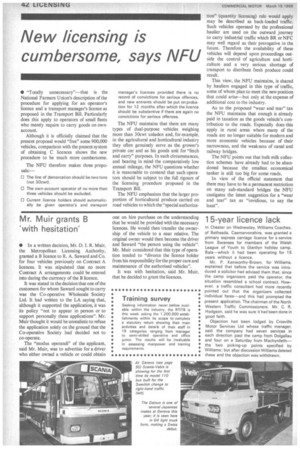New licensing is cumbersome, says NFU
Page 44

If you've noticed an error in this article please click here to report it so we can fix it.
• "Totally unnecessary"—that is the National Farmers Union's description of the procedure for applying for an operator's licence and a transport manager's licence as proposed in the Transport Bill. Particularly does this apply to operators of small fleets who merely require to carry goods on ownaccount.
Although it is officially claimed that the present proposal would "free" some 900,000 vehicles, comparison with the present system of obtaining C licences shows the new procedure to be much more cumbersome.
The NFU therefore makes three proposals:—
O The line of demarcation should be two tons (not 30cwt).
O The own-account operator of no more than three vehicles should be excluded.
O Current licence holders should automatically be given operator's and transport manager's licences provided there is no record of convictions for serious offences, and new entrants should be put on probation for 12 months after which the licence should be substantive if there are again no convictions for serious offences.
The NFU maintains that there are many types of dual-purpose vehicles weighing more than 30cwt unladen and, for example, in the agricultural and horticultural industry they often genuinely serve as the grower's private car and as his goods unit for "fetch and carry" purposes. In such circumstances, and bearing in mind the comparatively low annual mileage, the NFU questions whether it is reasonable to contend that such operators should be subject to the full rigours of the licensing procedure proposed in the Transport Bill.
The NFU emphasizes that the larger proportion of horticultural produce carried on road vehicles to which the "special authoriza
tion" (quantity licensing) rule would apply may be described as back-loaded traffic. Such vehicles operated by the professional haulier are used on the outward journey to carry industrial traffic which BR or NFC may well regard as their prerogative in the future. Therefore the availability of these vehicles will depend upon proceedings outside the control of agriculture and horticulture and a very serious shortage of transport to distribute fresh produce could result.
This view, the NFU maintains, is shared by hauliers engaged in this type of traffic, some of whom plan to meet the new position that could arise—but only at the expense of additional cost to the industry.
As to the proposed "wear and tear" tax the NFU maintains that enough is already paid in taxation as the goods vehicle's contribution to the roads. Especially does this apply in rural areas where many of the roads are no longer suitable for modern and more economic vehicles because of their narrowness, and the weakness of canal and railway bridges.
The NFU points out that bulk milk collection schemes have already had to be abandoned because the smallest economical tanker is still too big for some roads.
In view of the official statement that there may have to be a permanent restriction on many sub-standard bridges the NFU castigates the latest suggestion for a "wear and tear" tax as "invidious, to say the least".




































































































































